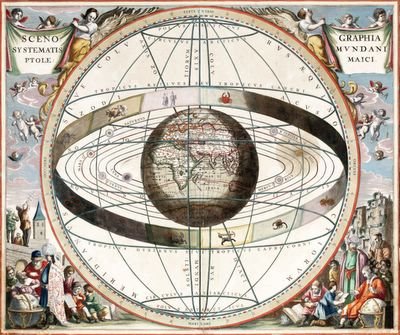
A little introduction to Ptolemy before we proceed further...
The Universe according to Ptolemy
The Greek astronomer Claudius Ptolemy (100-178 AD), lived in Alexandra in Egypt, at the meeting point of the ancient Arabic and European cultures. He summarised the astronomical knowledge of the Greek civilization in his book 'The Almagest', cataloguing 1,028 stars and describing all known variances of the constellations and legends of them. He gave the star formations the traditional names of the Greek and Roman cultures, which are still used today.
In his book Ptolemy also made a description of the solar system, the 'Field of Arbol', mainly based upon the results of the ancient Greeks, in particular of Hipparchus.
According to Ptolemy the Universe was an enclosed sphere with the Earth fixed in the centre. The stars were fixed on the inner side of the sphere, which was constantly rotating around the Earth. Between the stars and the Earth, the Sun, Moon, and planets and other Universal appearances were in rotary motion.
In the Ptolemaen system a planet describes an circular orbit (the epicycle), of which the centre rotates in an other circle, around a point that deviates from the centre of the Earth. By varying the speed of the planets and diameter of the various circles this gave an acceptable description of the planetary movements.
Ptolemy's Cosmos
The cosmology of the Almagest includes five main points:
- The celestial realm is spherical, and moves as a sphere (i.e., by rotating).
- The earth is a sphere.
- The earth is at the center of the cosmos.
- The earth is a point with respect to the heavens.
- The earth does not move. This statement applies to both motion from place to place and rotation on an axis.
Ptolemy assigned the following order to the planetary spheres, beginning with the innermost; a metal being assigned to each:
1. Moon (Luna) - Silver
2. Mercury - Mercury
3. Venus - Copper
4. Sun (Sol) - Gold
5. Mars - Iron
6. Jupiter - Tin
7. Saturn - Lead
8. Sphere of fixed stars
Outside this sphere was believed to be the abode of God and His Saints.
Ptolemy was the last of the great ancient astronomers, his ideas and descriptions of the planetary system lasted for 1400 years.
Addendum
"The thickness of the earth is measured by the space from the earth to the firmament. The seven divisions from the firmament to the earth are Saturn, Jupiter, Mercury, Mars, Sol, Luna, Venus. From the moon to the sun is 244 miles; but, from the firmament to the earth, 3024 miles. As the shell is about the egg, so is the firmament around the earth. The firmament is a mighty sheet of crystal."
Irish Druids And Old Irish Religions by James Bonwick [1894]
(Next Posting -The Discarded Image)





